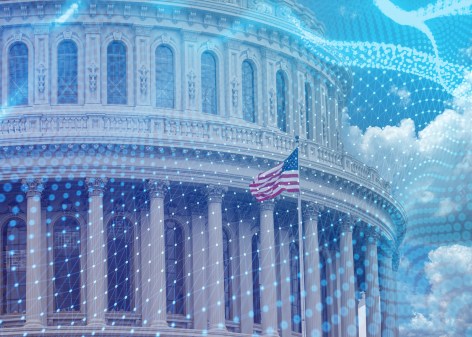GSA AI chief: USAi is an ‘immediate term’ product

A top General Services Administration official said Tuesday the agency does not see its new governmentwide artificial intelligence testing tool being used by agencies in the long term, predicting market dynamics could eventually take over.
Zach Whitman, the GSA’s chief data officer and AI officer, offered new details on how the agency envisions the government’s future use of USAi, which was launched late last week, FedScoop first reported.
“The idea is we want to make sure that we aren’t in the business … long term,” Whitman said during Salesforce’s Agentic AI Government Summit + Jamfest, presented by FedScoop.
“We think of this as a support infrastructure for the immediate term,” Whitman continued. “There is a point in time where this may not be as relevant, and we think that the market will step in and ultimately solve this problem.”
But until that point, Whitman explained that GSA wants to ensure agencies do not have “acquisition barriers or technical challenges” when trying to access and test different AI models.
He noted there is currently a lot of “dynamicism” between models. “Every week you have a new model that is potentially outperforming another.”
Whitman’s comments come just days after GSA officially launched USAi, an AI evaluation tool that gives federal agencies the ability to test major AI models. Models from Anthropic, OpenAI, Google and Meta were the first available for testing on USAi at its launch.
Still, more models are expected to be added following specific safety testing and review by teams at GSA. FedScoop reported last week that Elon Musk’s xAI Grok chatbot appeared to be under consideration for the GSA’s latest AI deals, but the large language model is still under review and wasn’t included in the initial USAi rollout.
The new project comes as part of the Trump administration’s push for AI integration into federal government workspaces. The GSA says these tools can assist federal workers with time-consuming tasks like document summaries.
USAi builds upon GSAi, a generative AI tool that was rolled out internally at the agency earlier this year. Whitman hinted last month that the GSA was looking into how it could integrate its AI product into other agencies.
“This is a unique opportunity because … when we built [GSAi], we built it for ourselves,” Whitman said, adding that, “we were doing it to manage our own; we wanted to make sure that we could see how folks were using this and work on our cultural adaptation to these tools.”
“Just augmenting this structure into a USAi framework where we effectively replicate our infrastructure for others, really isn’t that big of a lift,” he continued.
While the GSA has marketed USAi as a tool for all federal civilian agencies and the Defense Department, Whitman acknowledged its limitations.
“This is a shared service,” Whitman said. “You don’t have full control over it, and you don’t necessarily have complete autonomy with what models you want to use. And I think one of the disadvantages with a shared service platform is it’s meant for a general-purpose application. There are a ton of really niche use cases that would require specific adversarial models or specific models that would not fit with the general-purpose platform and wouldn’t necessarily bubble up to our immediate priority list when we’re talking about adding a specific tool or model or function to our platform.”
“So there’s definitely drawbacks here,” he continued. “But again, the main focus is to allow for agencies to get up to speed quickly at a low to zero cost, and then allow the market to take over.”
Once an agency tests a model on USAi, it has the option to procure it from the normal federal marketplace, two GSA officials told FedScoop last week. In other cases, an agency may stay on the USAi platform in the wake of changing market dynamics, but can still access the model for testing, the officials said.
GSA announced various collaborations this month as part of its OneGov strategy, including with OpenAI, Anthropic and Box, which will offer their products at a significantly discounted price to federal agencies. And FedScoop reported last week that the GSA is considering prioritizing the review of AI technologies in the procurement process.






